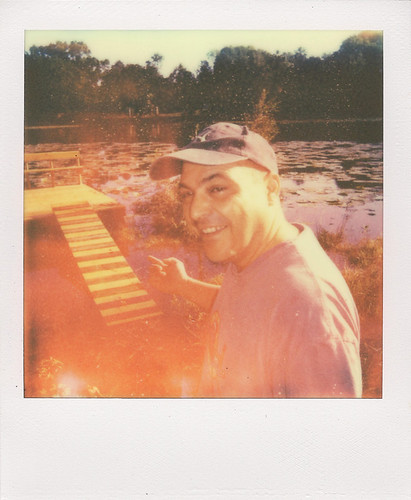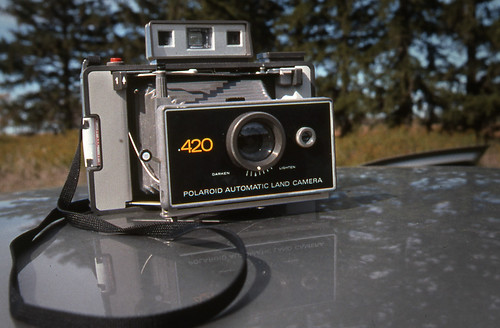
Film Photography Podcast Episode 36 - June 1, 2011
Download, Stream, iTune, Zune or listen below!
http://filmphotographypodcast.com/
Show Notes by Dan Domme
In the studio, Michael Raso is joined by John Fedele.

The Darkroom (http://thedarkroom.com/) is a very versatile lab in San Clemente, CA that offers a host of different services for film in all formats. They’ve decided to offer some free processing to five lucky winners of some 35mm slide film! Send an e-mail to FilmPhotographyPodcast@gmail.com (yo) to enter. Don’t forget to tell us a bit about yourself and your photography!
Below: The Perry Como Show with Live Polaroid Land Camera Commercial
Film is getting donated by and sent out to tons of listeners! If you have film or a working film camera that you wish to donate, send it to:
Film Photography Podcast
Michael Raso
PO Box 152
Butler, NJ 07405
John “Trackman” Casimiro calls in and makes a quick guest appearance. Mike talks about maintaining professionalism, whether it’s operating a (ahem) high-class organization like the Film Photography Project or even your own personal photography blog.
Below: The Trackman

Mike shares a stupid mistake he made with his Polaroid Pack camera, not changing the ASA setting after switching films. Don’t let this happen to you... Watch the video below!
Below: Polaroid Troubleshooting: No Exposure!

Interested in a Polaroid Packfilm camera, a/k/a a 100-series Land Camera, but don’t know where to start? Mike suggests that you check out a Polaroid 420, which is the Land Camera of choice for photographers April-Lea Hutchinson and FPP’s own Mat Marrash. Not necessarily better or worse than any other land camera, but a model that has found some popularity among certain FPP members. Feeling picky? Check out the infamous Land List to find the model that’s right for you...
...Otherwise, pick up a 420 camera from the Film Photography Store today! Want Mike to put a custom package together for YOU? Shoot Mike an e-mail at FilmPhotographyPodcast(AT)gmail(DOT)com and just ask. All profits from camera sales go back into running The Film Photography Podcast!
http://filmphotographystore.com/
Below - FPP video: Polaroid 420 Automatic Land Camera
Michael breaks the news about the latest product from Lomography, the Lomo LC-Wide
The Lomography LC-Wide Microsite
http://microsites.lomography.com/lc-wide/
A letter by listener James Dean sparks a discussion on the right for photographers to shoot, and how to deal with security guards, even ones who work for Tiny Tim! (Perhaps Michael & John will reveal a shocking tale in a future episode?)
Overall, the philosophy that Mike and John suggest you adopt (regarding security and the police on the street) is that of John Rambo - to simply “Let it go.”
Below: First Blood (Rambo) - Let It Go!
Mike tells us about a recent article in American Photo Magazine that suggests that it’s impossible to make Polaroid image transfers today. His proposed solution is to write a kind and professional e-mail to the magazine editor to explain how you can still achieve the result using Fuji FP-100C Packfilm.
Continuing with the Land Camera theme of the show, Mike talks about an effect he stumbled on by accident - Shutter Lag! Freeze some action by using a flash, then take in the background by keeping the shutter open. Mike suggests moving the exposure dial towards “lighten.” After the flash fires, the Electric Eye of the Polaroid camera should stay open for a moment, allowing you to create dreamy or wacky photos. Watch the following video as Mike explains exactly what to do:
Below: Polaroid Painting with Light
A listener tips off Mike to a new camera manufacturer, Argus! Get the 4-1-1 by checking out the Argus Collectors Group! http://www.arguscg.org/
Finally, FPP Listener Tony Kwong fills us in on the turbulent history of Camerapedia, and how it has split into two similar sites, camerapedia.wikia.com and camera-wiki.org
One of many explanations of the demise of Camerapedia:
http://www.steevithak.com/2011/02/27/goodbye-camerapedia-hello-camera-wiki-org/
Finally, a letter sent to us from Steve at Camera-Wiki
Hey guys,
Just caught your latest podcast where you talk about the death and
resurrection of Camerapedia as Camera-wiki.org. I'm afraid you got a few
things majorly confused! Sorry for a long rant but would really like to
clear up your misunderstanding of things. ;)
Two main points
1. Camerapedia (that is, the website content and community of
contributors) was not bought by anyone, it simply lost it's domain
name.
2. The domain name Camerapedia.org was NOT bought by Wikipedia (the free
online encyclopedia), it was bought by Wikia (a for-profit corporation).
They are not the same thing. The fact that you "don't remember seeing
ads on Wikipedia anyway" is because there are none, Wikipedia is not
Wikia. Wikipedia is an ad-free, non-profit venture.
I realize all these words that start with "wiki" are confusing to people
who are not net-savvy in much the same way that camera jargon confuses
non-camera people. Here's a quick run down:
Wiki: a type of website technology that allows anyone to create and edit
content
Wikipedia: a particular website and non-profit organization building an
encyclopedia based on Wiki technology. Wikipedia is one example of a
Wiki; there are many others. Camerapedia, now known as camera-wiki.org
is another example of a wiki.
Wikia: a for-profit corporation whose goal is to buy up high-traffic
wiki sites by any means available and use them to drive traffic to their
ad servers.
Wikia has a long history of taking over community wiki sites through
unscrupulous means, often by finding a single point of failure, such as
one person who controls a key component of the site and buying them off.
In the case of Camerapedia, one person had full control of the domain
name and sold it to Wikia without the permission or knowledge of the
Camerapedia community.
The problem wasn't primarily image rights but that Wikia wanted to take
control of *everything* away from the community. They would dictate
everything from how the site looked to what content was allowed.
Further you misunderstood the image rights problem. Camerapedia worked
by using flickr for hosting. That meant you could always click on a
photo to get the photographer's flickr page and read more about it.
Wikia put an end to that and mandated local hosting of photos. They
began wholesale copying of photos from flickr without the permission of
the photographers and, in the process, stripped off copyrights,
photographer credits, and any identification of the copyright holder,
replacing it with their own information, suggesting viewers that all the
image were owned by Wikia.
So the problem the Camerapedia community had with all this was far from
just a gripe about ads being placed near their flickr photography as you
suggested in the podcast.
One last point, you indicated that Camera-Wiki.org was lacking content
that used to be on Camerapedia. This is not really correct. With the
exception of a small number of restricted use photos (that were replaced
with new, equivalent photos) Camera-Wiki.org started on day 1 with the
same content it always had under the Camerapedia.org name and, in fact,
now has over 400 pages of new content. This was not a "split" in the
sense that each site ended up with only partial content.
Wikia has not faired well with their commercial copy of the site because
1) they have almost no contributors adding new content and 2) many old
contributors have since removed 50-75% of the images from their site.
To sum all this up, a better way to look at the whole mess is that an
annoying company took away Camerapedia's domain name and we got a new
one, Camera-wiki.org. Otherwise, things are continuing as usual.
-Steve

What is FPP?
The Film Photography Project seeks to inform, engage and inspire amateur and professional photographers working in the traditional film medium. Launched by FPP founder Michael Raso in 2009, FPP provides a forum for photographers from around the globe to share their creative output, challenges and product reviews, while promoting the viability of vintage cameras and film through frequent give-aways and exchange programs. In addition to the Film Photography Podcast Internet Radio Show, the Film Photography Project network of imprints includes the FPP Flickr Page, YouTube Channel, Facebook Group, Twitter Account, newsletter and the Film Photography Project Store.

About FPP Founder Michael Raso
Michael Raso is passionate about film as a viable and exciting medium for the visual artist, even in this age of digital photography. A photographer, producer and filmmaker working professionally in the visual arts for over 20 years, Michael is also the founder of the Film Photography Project and its fortnightly internet radio show, the Film Photography Podcast. At last count, Michael was actively shooting with over 50 vintage cameras.
http://www.filmphotographypodcast.com
Have a question about your film photography? E-mail me anytime!
Michael Raso
FilmPhotographyPodcast (AT) gmail.com

Purchase your own Polaroid 420 Camera at the FPP Store!
Content Copyright 2011 Film Photography Project, L.L.C. All Rights Reserved.
No comments:
Post a Comment